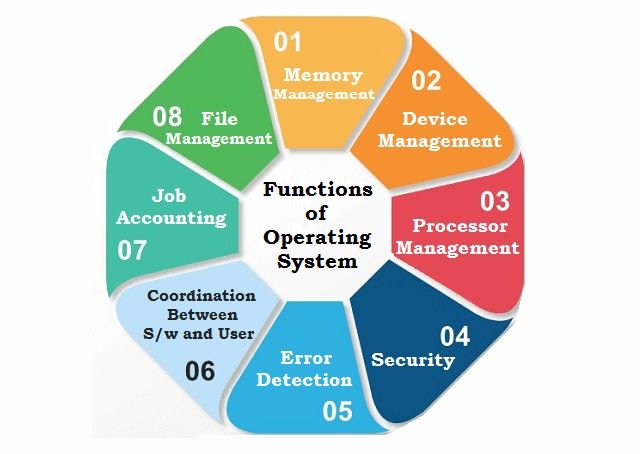Back to: DATA PROCESSING SS 1
Welcome to class!
In today’s class, we will be talking about the functions of the operating system. Enjoy the class!
Functions of Operating System

The operating system performs the following functions:
- Storage Management: Operating system also controls all the storage operations. This means how the data or files will be stored into the computers and how the file will be accessed by the users etc. Creation of files, Directories. The operating system performs the following :
- It allows the creation of files and directories.
- It allows the reading of data from and writing of data to files and directories.
- It copies the contents of the files and directories from one place to another.
- Process Management: The operating system also treats the process management. That is, an operating system has to handle processes given it by the users; the system own process as well.
- Memory Management: It manages the sharing of internal memory among multiple applications. E.g., Primary Memory: RAM, ROM; Secondary Memory: Hard disc, CD, DVD
- Resources Management: Operating system manages all the resources of the computer system. Both the hardware (Input, Output and Peripheral) and the software resources.
- Security Management: these include: Virus management, Alert messages, passwords, Access protection etc.
- Load and run application software: the operating system determines which application should run in what order and how much time should be allowed for each application before giving another application a turn.
Moreover, Operating System also provides certain services to the computer system in one form or the other. The Operating System provides certain services to the users which can be listed in the following manner:
- Program Execution: The Operating System is responsible for the execution of all types of programs whether it be user programs or system programs. The Operating System utilizes various resources available for the efficient running of all types of functionalities.
- Handling Input/output Operations: The Operating System is responsible for handling all sort of inputs, i.e., from the keyboard, mouse, desktop, etc. The Operating System does all interfacing most appropriately regarding all kind of Inputs and Outputs. For example, there is a difference in nature of all types of peripheral devices such as mouse or keyboard, then Operating System is responsible for handling data between them.
- Manipulation of File System: The Operating System is responsible for making decisions regarding the storage of all types of data or files, i.e., floppy disk/hard disk/pen drive, etc. The Operating System decides as to how should the data be manipulated and stored.
- Error Detection and Handling: The Operating System is responsible for the detection of any types of error or bugs that can occur while any task. The well-secured OS sometimes also acts as a countermeasure for preventing any sort of breach to the Computer System from any external source and probably handling them.
- Resource Allocation: The Operating System ensures the proper use of all the resources available by deciding which resource to be used by whom for how much time. All the decisions are taken by the Operating System.
- Accounting: The Operating System tracks an account of all the functionalities taking place in the computer system at a time. All the details such as the types of errors occurred are recorded by the Operating System.
- Information and Resource Protection: The Operating System is responsible for using all the information and resources available on the machine in the most protected way. The Operating System must foil an attempt from any external resource to hamper any sort of data or information.
Evaluation
- Define the operating system.
- State six functions of the operating system.
General evaluation
- What is an operating system?
- List functions of the operating system.
- What do you understand by memory management?
- Without an operating system, what would happen to a computer?
Reading assignment
HIIT @ Schools, Data Processing for Senior Secondary Education, pgs 31 – 32.
Weekend assignment
- Which function of the operating system deals with the creation of files and directories. A. Memory management B. Resources management C. Storage management D. All of the above
- Control of the right and access to a file is ……… function of O.S. A. Memory management B. Resources management C. Storage management D. Process management
- ……… handles processes in the computer. A. DBMS B. O.S C. Software D. Hardware
- The …….. part of a computer is synchronized to perform tasks. A. Monitor B. Keyboard C. CPU D. System unit
- The hardware part of the computer has ……… A. 2 B. 3 C. 5 D. 7
Theory
- Explain the security management functions of the operating system.
- Mention four examples of secondary memory.
We hope you enjoyed the class.
Should you have any further question, feel free to ask in the comment section below and trust us to respond as soon as possible.

fully explain about the operating system…really grateful to read this
it is good for learning amqzing